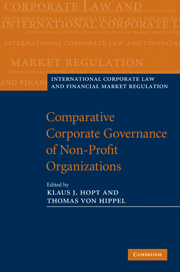Book contents
- Frontmatter
- Contents
- List of contributors
- Preface
- Abbreviations
- PART I Economic findings and theories on nonprofit organizations
- PART II The nonprofit sector: private law, trust law, tax law in selected countries
- 4 Anglo-American countries
- 5 Germanic countries
- 6 Romanic countries
- 7 Transformation countries
- 7.1 Nonprofit organizations in Hungary
- 7.2 Nonprofit organizations in the Czech Republic
- 7.3 Nonprofit organizations in the People's Republic of China
- PART III The board of nonprofit organizations
- PART IV Good governance of nonprofit organizations: activities and regulatory problems
- PART V Good governance of nonprofit organizations: self-regulation, disclosure and supervision
- Index
- References
7.1 - Nonprofit organizations in Hungary
from 7 - Transformation countries
Published online by Cambridge University Press: 05 August 2011
- Frontmatter
- Contents
- List of contributors
- Preface
- Abbreviations
- PART I Economic findings and theories on nonprofit organizations
- PART II The nonprofit sector: private law, trust law, tax law in selected countries
- 4 Anglo-American countries
- 5 Germanic countries
- 6 Romanic countries
- 7 Transformation countries
- 7.1 Nonprofit organizations in Hungary
- 7.2 Nonprofit organizations in the Czech Republic
- 7.3 Nonprofit organizations in the People's Republic of China
- PART III The board of nonprofit organizations
- PART IV Good governance of nonprofit organizations: activities and regulatory problems
- PART V Good governance of nonprofit organizations: self-regulation, disclosure and supervision
- Index
- References
Summary
Introduction
The term “nonprofit organizations”
Nonprofit
The legal term “nonprofit” is widely used in Hungarian sociological and legal materials. Even before the collapse of the socialist system the term was regularly used by sociologists, and this only increased after the change of the political system. Recently the term “nonprofit” has been used even in legal materials, acts and other legal instruments as well. The new Act on Companies no. IV of 2006 (“New Company Act”), applicable from 1 July 2006, which partially came into force only on 1 July 2007, uses the term “nonprofit business company”. The actual word “nonprofit” was not translated into Hungarian: in the original Hungarian version, “nonprofit business company” is translated as nonprofit gazdasági társaság (section 4(1) New Company Act).
The pioneering act on nonprofit organizations in Hungary (Act no. CLVI of 1997; the “Nonprofit Act” or “NPO Act”) was given a different title – in Hungarian közhasznú szervezetekről – which can be translated as “on public purpose organizations”. The Hungarian wording is different, though the meaning is the same as in the definition of the New Company Act.
The minister of education passed a decree on the terms and conditions of examinations and job requirements for the education of nonprofit administrators and nonprofit managers, including training for where the wording “nonprofit” should be used. The purpose of the decree is clearly to provide a specified education funded and granted for nonprofit organizations.
- Type
- Chapter
- Information
- Comparative Corporate Governance of Non-Profit Organizations , pp. 325 - 378Publisher: Cambridge University PressPrint publication year: 2010
References
- 1
- Cited by



